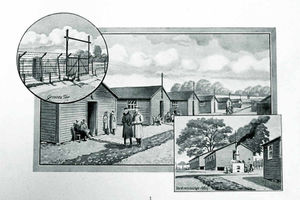Prisoner lost his life in Oswestry camp disturbance
A defeated enemy they may have been, but the German prisoners held at Park Hall Camp in Oswestry were out to make things difficult for their British captors.

And so it was that, only a few days after the the peace treaty in 1919 which officially brought the Great War to an end, 20-year-old Willie Oster was shot dead by one of the guards.
The German prisoners had become unruly since the signing of peace. Led by their officers, they refused to parade for roll call. The German officers threw parcels of food out of their compound to German privates, infuriating the guard.
As tensions rose, several hundred Germans gathered near the sentry's post and threw stones at him. The sentry, a Private Maycock of the Leicestershire Regiment, told the subsequent inquest that a riot was threatened and he told the prisoners he would fire if they did not stop.
Stone-throwing and bad language continued, and he fired at the latrine to show he serious. Oster, who had climbed to the top of the latrine – to secure a sack of biscuits, said another prisoner – was hit and killed.
Sympathy for the Germans was distinctly limited. Press reports said Oster threw a brick at the sentry, although Private Maycock's testimony was that he had not seen Oster, and it had been a warning shot. He did not know until five minutes later that Oster had been hit, he said.
The jury returned a verdict of misadventure and exonerated Maycock from blame.
Oster was buried in the German cemetery at Park Hall with full military honours. He now lies at the German cemetery at Cannock Chase.
l The story of the Park Hall prison camp and extracts from a prisoner's diary are featured on BBC Radio Shropshire tomorrow.





